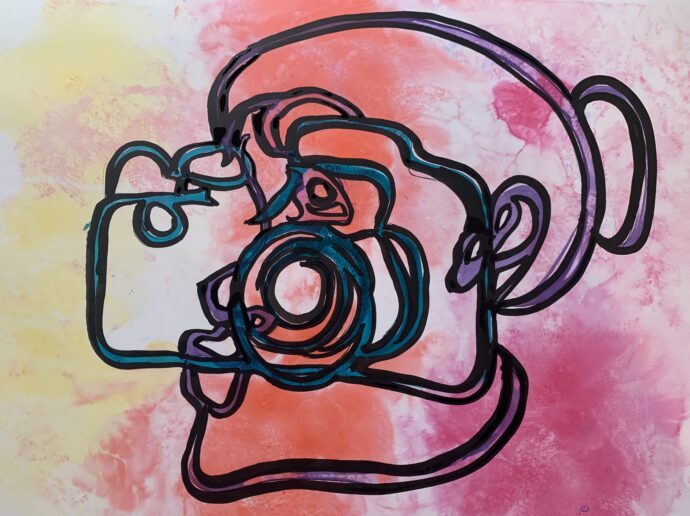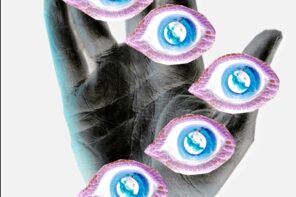Translated from the Korean
An Autumn of Walks
A woman placed carefully inside a glass display case, like a can of milk; naturally, the milk won’t come out if you don’t make a hole. Other than the beauty of the letters, which are painted in various colors—crimson, green—one’s only joy is the surprising weight of an embrace. Here there is autumn, and void.
Silence of a department store on a rainy day! And on an unpeopled street in which the commodities quietly preserve my shadow, the subtly heavy curve, as it kicks out from under a light pink skirt, of a woman’s peach-colored calf. I am ready, on this autumn-infused street where the radio blasts a melancholy song to sadden the store manager, to abandon everything—everything, that is, except for that peach-colored calf, which seems to me more delicious than any fruit I can imagine.
In the window, alabaster statues—a beardless warrior, a Venus without an inch of unpowdered skin. Two alabaster statues that do not for a moment abandon their tedious poses.
The soda, whose taste is mixed with autumn’s, is as cold as an intravenous injection. On the waists of the girls in uniform, the ribbons glitter cleanly, and the skin of their naked wrists, which have escaped their rain-speckled uniforms, is like wrapping paper purer than wrapping paper, their uniforms like skin purer than skin. In the department store, new merchandise; much more so than objects, what must be inside these gift-wrapped boxes—who come walking busily toward me, tangled in ribbons—is curiosity.
Summer has passed; why hasn’t the dark photograph shed its skin? Pensive early evening, in which the precarious heart of a young girl, under the pale moonlight, powders a sheet of photosensitive paper.
The fruit shop is closed. Behind the shop window, in the fragrant air that the fruits saturate with their breathing: peaches. Now that this secret is hidden, no one will stop in to buy fruit. Roll them around as much as you like, or throw them at the head of the shop owner, which resembles an unripe watermelon—the fruit will still be fruit. In the fragrance of peaches is the fragrance of peaches, and more peaches, bananas in peaches, bananas…
The inside of the print shop is flipped to the left. All the worker’s faces are in the mirror. Even when they eat, they use their left hands. Perhaps even my eyes are left-handed; I shake hands with the workers using my left hand, easily. And I converse with them ingeniously using accumulated sinistral knowledge. They sit opposite me, at rest—and yet, for reasons I can’t explain, my description of them is “right.” Feeling ill and on the verge of fainting at this vast crossroads of left and right, I run out the door; and, sure enough, in the space of a single step, the workers all at once revert to the right. They will only, it seems, converse with a flâneur on the condition that he be outside their place of work.
Advertising leaflets dropped from an airplane float in an open sewer near Cheongyecheon. The local children play at collecting them, fluttering about messily, coming together repeatedly and then dispersing, much like leaflets themselves. “Macnin, for the Elimination of Roundworm”—but none of them can read this. These local children are entirely roundworm, and playing near a sewer drain is enough for them to forget that their stomachs ache. Perhaps your parents have thrown you out, declaring you trash; despite that you play well, under no one’s control, shouting and wriggling like emaciated little minnows.
A raucous scene at the roller rink. Is this some kind of seasonal forgery, like radio sound effects? The moonlight, in its blueness, is like the sound of the suburbs. It is winter here at the rink—and standing before this sweaty winter, the dregs of summer, covered in goosebumps, also sweat. Here on this imitation ice, which plays so well at being winter, perhaps you humans will discover, in time, that you yourselves are human dolls. Who’s to say?
Seomangyul-do (Chestnut Island, Seen from the West)
In the village, where the pear blossoms are said to bloom in winter, there was nothing but a crow perched like a prison guard on the branch of a dry tree.
Prisoners the color of red clay broke up red clay on the embankments. My feet were soaked in fragrant mud. I no longer knew where to go.
I thought, maybe I’ll go to the river. I sat and polished the lenses of my non-prescription glasses on a rock where, sobbing, I used to paint watercolors. It was March. Below the rock the river was murky and listless. To the west was Bamseom, Chestnut Island, through which on occasion a weak light would emerge, then disappear. I kept looking down into the waves, which seemed to be mixed with asphalt.
The climate in my country’s like hair
Provoke it, and it turns red
On the riverside, the lazy sounds of cargo being unpacked. Chickens swarmed next to muddy woodpiles; the boats had all taken down their sails. After a while I heard, from somewhere behind me, the sound of laundry bats that, by then, must have already been put back down. Suddenly, I missed people.
I stopped in a bar near the riverside. No customers. Just four or five discarded clamshells scattered around the grill. From the back of the bar a woman emerged, silent, wearing a white mourning gown so freshly starched it seemed it might cut her hand. She was not wearing a ring.
I had a drink, with wild chives in red sauce on the side. Over the bar I felt, with a chill, the Holy Mother. I felt the “I” of my sick bloodline.
The climate in my country’s like hair
Provoke it, and it turns red
And then,
The site of my pain is touched
To bring my bloodline to an end
Even in soft shoes, everything burns
Now Chestnut Island is on the verge of new growth. With the eyes of someone who might, at any moment, be slapped, I look out onto the other side of the river, where the landscape, in a yellow tangle, gently sways.
산책의 가을
여인 유리장 속에 가만히 넣어 둔 간쓰메, 밀크, 그렇지 구멍을 뚫지 않으면 밀크는 안 나온다. 단홍백 혹은 녹(綠), 이렇게 색색이 칠로 발라 놓은 레테르의 아름다움의 외에, 그리고 의외에도 묵직한 포옹의 즐거움밖에는 없는 법이니 여기 가을과 공허가 있다.
비 오는 백화점에 적(寂)! 사람이 없고 백화(百貨)가 내 그림자나 조용히 보존하고 있는 거리에 여인은 희붉은 종아리를 걷어 추켜 연분홍 스커트 밑에 야트막이 묵직히 흔들리는 곡선! 라디오는 점원 대표 서럽게 애수를 높이 노래하는 가을 스미는 거리에 세상 것 다버려도 좋으니 단 하나 가지가지 과일보다 훨씬 맛남직한 도색(桃色) 종아리 고것만은 참 내놓기가 아깝구나.
윈도 안의 석고(石膏)― 무사는 수염이 없고 비너스는 분 안 바른 살갗이찾을 길 없고 그리고 그 장황한 자세에 단념이 없는 윈도 안의 석고다.
소다의 맛은 가을이 섞여서 정맥주사처럼 차고 유니폼 소녀들 허리에 번쩍번쩍하는 깨끗한 밴드, 물방울 낙수지는 유니폼에 벌거벗은 팔목 피부는 포장지보다 정한 포장지고 그리고 유니폼은 피부보다 정한 피부다. 백화점 새물건 포장 ― 밴드를 끄나풀처럼 꾀어 들고 바쁘게 걸어오는 상자 속에는물건보다도 훨씬훨씬 호기심이 더 들었으리라.
여름은 갔는데 검둥 사진은 왜 허물이 안 벗나. 잘된 사진의 간줄간줄한소녀 마음이 창백한 월광 아래서 감광지에 분 바르는 생각 많은 초저녁.
과일가게는 문이 닫혔다. 유리창 안쪽에 과일 호흡이 어려서는 살짝 향훈(香薰)에 복숭아 ― 비밀도 가렸으니 이제는 아무도 과일 사러 오지는 않으리라. 과일은 마음껏 굴려 보아도 좋고 덜 익은 수박 같은 주인 머리에 부딪쳐 보아도 좋건만 과일은 연연(然然)! 복숭아의 향훈에, 복숭아의 향훈에복숭아에 바나나에······.
인쇄소 속은 죄 좌(左)다. 직공들 얼굴은 모두 거울 속에 있었다. 밥 먹을때도 일일이 왼손이다. 아마 또 내 눈이 왼손잡이였는지 모르지만 나는 쉽사리 왼손으로 직공과 악수하였다. 나는 교묘하게 좌(左)된 지식으로 직공과 회화하였다. 그들 휴게와 대좌하여 ― 그런데 웬일인지 그들의 서술은 우(右)다. 나는 이 방대한 좌와 우의 교차에서 속 거북하게 졸도할 것 같길래 그냥 문 밖으로 뛰어나갔더니 과연 한 발자국 지났을 적에 직공은 일제히 우로 돌아갔다. 그들이 한인(閑人)과 대화하는 것은 꼭 직장 밖에 있는 조건인 것을 알 수 있었다.
청계천 헤벌어진 수채 속으로 비행기에서 광고 삐라, 향국(鄕國)의 동해(童孩)는 거진 삐라같이 삐라를 주우려고 떼지었다 헤어졌다 지저분하게 흩날린다. 마꾸닝 회충 구제 그러나 한 동해도 그것을 읽을 줄 모른다. 향국의 동해는 죄다 회충이다. 그래서 겨우 수챗구멍에서 노느라고 배 아픈 것을 잊어버린다. 동해의 양친은 쓰레기라서 너희 동해를 내다버렸는지는 모르지만 빼빼 마른 송사리처럼 통제 없이 왱왱거리며 잘도 논다.
롤러 스케이트 장의 요란한 풍경, 라디오 효과처럼 이것은 또 계절의 웬계절 위조일까. 월색이 푸르니 그것은 흡사 교외의 음향! 그런데 롤러 스케이트 장은 겨울 ― 이 땀 흘리는 겨울 앞에 서서 찌꺼기 여름은 소름끼치며 땀 흘린다. 어떻게 저렇게 겨울인 체 잘도 하는 복사 빙판 위에 너희 인간들도 결국 알고 보면 인간모형인지 누구 아느냐.
서망율도(西望栗島)
삼동에 배꽃이 피었다는 동리에는 마른나무에 까마귀가 간수처럼 앉아 있을 뿐이었다.
비탈에서는 적톳빛 죄수들이 죄토를 헐어낸다. 느끼하니 냄새 풍기는 진창길에 발만 성가시게 적시고 그만 갈 바를 잃었다.
강으로나 가볼까 ― 울면서 수채화 그리던 바위 위에서 나는 도(度) 없는 안경알을 닦았다. 바위 아래 갈피를 잡지 못하는 삼월 강물이 충충하다. 시원찮은 볕이 들었다 났다 하는 밤섬을 서(西)에 두고 역청 풀어 놓은 것 같은 물결을 나는 몇 번이나 몇 번이나 내려다보았다.
향방(鄕邦)의 풍토는 모발 같아
건드리면 새빨개진다
갯가에서 짐 푸는 소리가 한가하다. 개흙 묻은 장작더미 곁에서 낮닭이 겨웁고 배들은 다 돛폭을 내렸다. 벌써 내려놓은 빨래방망이 소리가 얼마 만에야 그도 등 뒤에서 들려왔다. 나는 별안간 사람이 그리워졌다.
갯가에서 한 짐 목로를 들렀다. 손이 없다.
무명조개 껍질이 너덧 석쇠 놓인 화롯가에 헤뜨러져 있을 뿐. 목로 뒷방에서 아주먼네가 인사 없이 나온다. 손 베어질 것 같은 소복에 반지는 끼지 않았다.
얼큰한 달래 나물에 한잔 술을 마시며 나는 목로 위에 싸늘한 성모를 느꼈다. 아픈 혈족의 ‘저’를 느꼈다.
향방의 풍토는
모발 같아
건드리면
새빨개진다
그러고 나서는,
혈족이 저물도록
내 아픈 데가 닿아서
부드러운 구두 속에서도
일마다 아리다
밤섬이 싹을 틔우려나 보다. 걸핏하면 뺨 얻어맞는 눈에 강 건너 일판이 그냥 노오랗게 헝클어져서는 히늑히늑해 보인다.
Michael Joseph Walsh is the author of Innocence (CSU Poetry Center, 2022) and co-editor of APARTMENT Poetry. His poems, reviews, and translations from the Korean have appeared in The Brooklyn Rail, DIAGRAM, Guernica, Fence, jubilat, and elsewhere. He lives in Denver.
Yi Sang (이상) (1910-1937) was one of the most important Korean avant-garde writers of the Japanese colonial era. Trained as an architect, he is known especially for his long poem “Crow’s Eye View” and his short story “The Wings.” The Yi Sang Literary Award, one of Korea’s most prestigious literary prizes, is named in his honor. He died in Tokyo from complications of tuberculosis following his arrest by Japanese authorities for suspected ideological crimes against the Empire of Japan.
Translation Series curated by Jae Kim.


